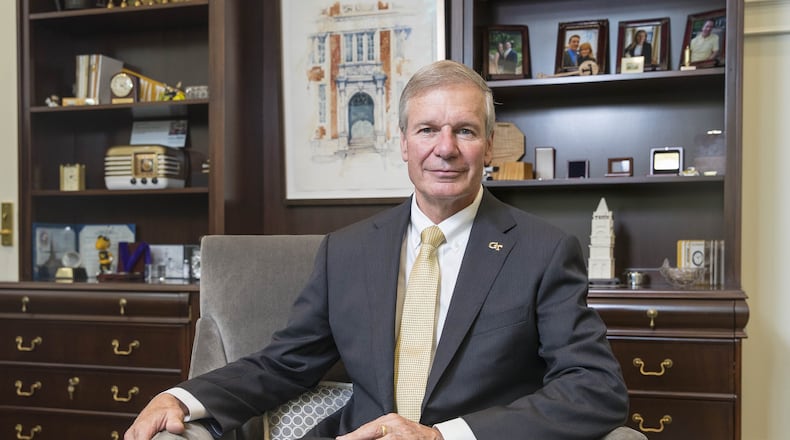Georgia Tech President G.P. "Bud" Peterson has a long to-do list before he retires this year, such as restoring confidence that Tech has strong ethics regulations in place after a recent scandal involving some former top officials; filling several vacancies on his leadership team, and improving student mental health and counseling services after two recent apparent suicides.
Peterson announced his departure plans Monday, the first day of the new semester, after 10 years for which he leaves a record of some successes but recent criticism about his leadership and questions about Georgia Tech’s future.
In recent months, Peterson fired several top officials, accepted the resignation of others and reorganized his leadership team after state and internal audit reports found several problems such as an administrator who was paid to serve on the board of a German-based company that Tech was paying for services and another official who had a school vendor pay for a football suite he used largely for friends and family.
In a telephone interview Monday with The Atlanta Journal-Constitution, Peterson said he was not under pressure from state officials, trustees or donors to leave. Peterson said he wanted to resolve some of the ongoing problems. He wants to hire a chief financial officer, vice president of compliance, ethics and legal affairs and a communications director before he leaves.
“We’ve had some tough times. I didn’t want to leave in the middle of all of that,” he said.
Peterson was chastised by University System of Georgia Chancellor Steve Wrigley after the revelations for "lax management." Peterson has repeatedly said he's been "disappointed" and "embarrassed" by the revelations. The AJC reported last fall Georgia Tech has had a backlog of ethics complaints and is often slow in investigating claims.
In addition to the ethics and mental health problems, in late July Tech mistakenly emailed personal information of nearly 8,000 College of Computing students to fellow students.
Peterson, who has vowed to “fix this,” has faced pressure to improve counseling and mental health services after two students died from apparent suicides near the end of the fall semester.
Peterson, 66, said he’s been considering retiring once reached his tenth anniversary at Tech, which will take place in April. By then, Peterson will meet the age and tenure requirements to receive full retirement benefits. His current annual compensation, $1,135,710, is the highest of any public college president in the state. Peterson’s retirement benefits could exceed six figures annually.
Common Cause Georgia executive director Sara Henderson has urged state lawmakers to get more involved in monitoring Georgia Tech’s internal reporting. She reiterated such demands Monday.
“I’d say this is a good time for an independent audit of all financial procedures at Georgia Tech. It’s imperative that the Board of Regents use this opportunity to show that no school in Georgia will be allowed to operate using unethical and non-transparent practices,” she said.
Peterson said he believes he’s addressed some of the challenges. He mentioned a November memo from Wrigley that said Tech has made some progress on its ethics policies and training. On the student mental health front, Peterson said Tech has accelerated the hiring of additional counselors and now has enough counselors to meet national standards.
“I feel like we have turned the corner,” he said. “I feel good about where Georgia Tech is.”
Peterson has presided over a major increase in enrollment as Georgia Tech has expanded its online offerings in recent years. Georgia Tech’s enrollment increased by 11 percent this fall, to more than 32,700 students, the largest increase in the University System of Georgia as college enrollment declines nationally. It’s consistently ranked by prominent organizations as one of the nation’s top colleges and universities. Wrigley lauded Peterson for his efforts to enroll more women and Atlanta Public Schools students and for bringing about 30 corporations to its campus, which the chancellor said has “transformed the landscape of midtown Atlanta.”
A mechanical engineer with degrees from Kansas State and Texas A&M universities, Peterson was chancellor of the University of Colorado at Boulder when he was hired to lead Georgia Tech. Peterson said he wants to teach again, noting he’s worked on research projects here and wants to focus on topics such as thermodynamics.
Peterson said his proudest accomplishments include the strong academic credentials of incoming students, noting many have never received a B before coming to Tech, and the increase in applications.
Peterson’s impending departure is not the only major leadership change at the Midtown Atlanta school. Head football coach Paul Johnson departed at the end of the season.
The University System of Georgia will conduct a national search for Peterson's replacement. Peterson said he plans to stay as president until a replacement is hired. Three other system presidents, at Georgia Gwinnett College, Georgia Southern and Savannah State universities, have left or announced plans to leave this school year.
The story so far:
July 2018: Georgia Tech releases reports that disclose several ethics lapses by top administrators, who've since resigned or were fired.
November 2018: Georgia Tech President G.P. "Bud" Peterson gives his second update to the University System of Georgia about efforts to improve ethics regulations, training and investigations.
Jan. 7: Peterson announces plans to retire later this year.
Here are some of the top offices at Georgia Tech that do not have full-time leaders:
- executive vice president/administration and finance
- Georgia Tech Research Institute director
- vice president of compliance, ethics and legal affairs
- senior vice president of administration
- vice president of communications
- associate vice president/institute planning & resource management
About the Author




